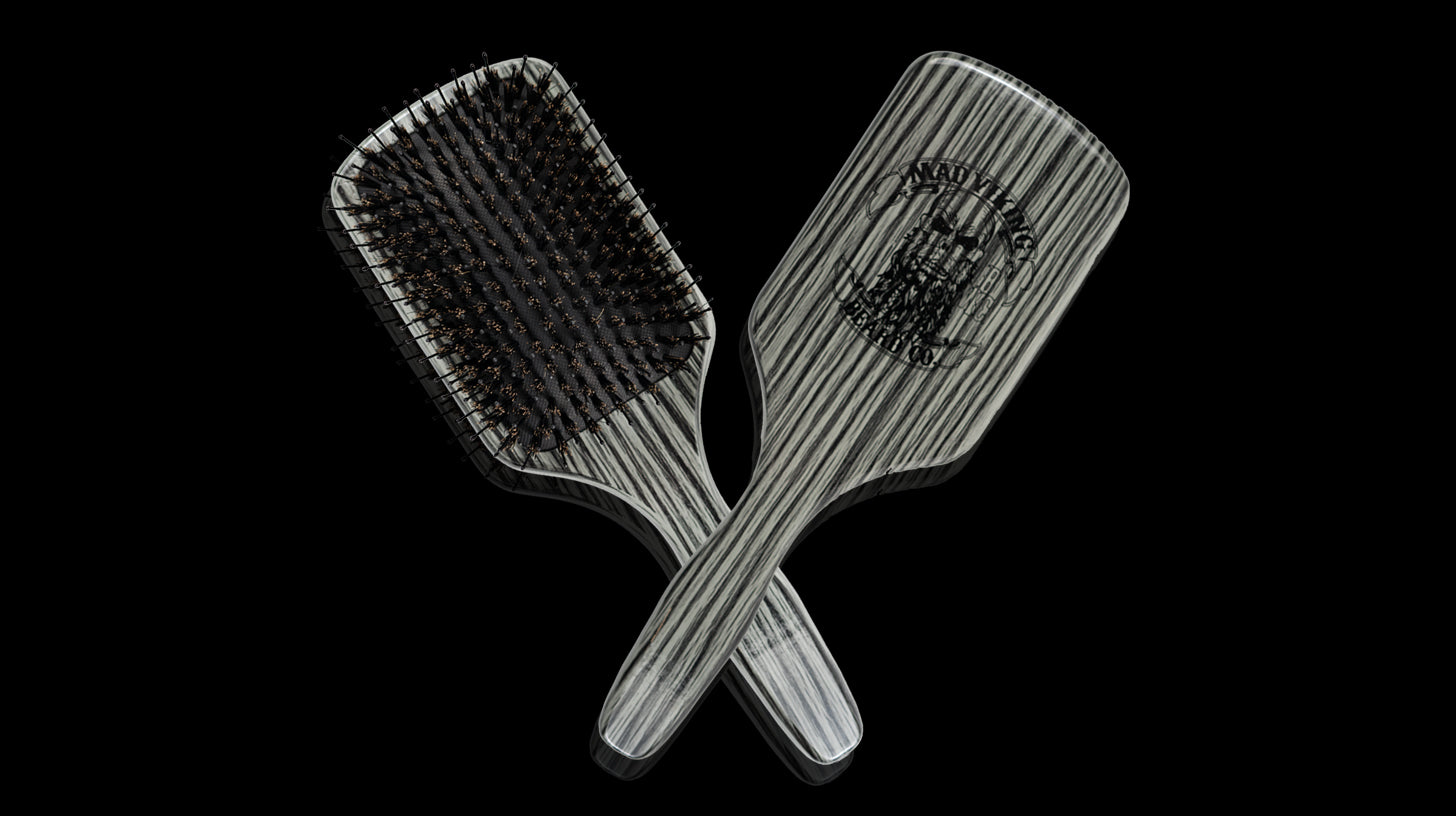Why Does My Hair Get Greasy So Fast? Uncovering Top Causes and Remedies

Is your hair getting greasy faster than you can say "shampoo"? You're not alone in this struggle! Many beauty enthusiasts, hair care lovers, and health & wellness seekers find themselves battling with greasy hair, which can be frustrating and impact your confidence. Understanding the underlying reasons for excess oil production is key to managing this common issue more effectively and finding lasting solutions that work for you.
Greasy hair can result from various factors, including hormonal changes, diet, and even the products you use. In this post, we'll dive deep into the top causes of greasy hair, such as overactive sebaceous glands and improper washing techniques. We'll also offer a range of practical remedies and tips that can help you keep your locks looking fresh and fabulous, from adjusting your hair care routine to exploring natural remedies.
Say goodbye to the greasy hair blues and hello to healthier, shinier hair!
Overactive Sebaceous Glands

One prevalent cause of greasy hair is the overactivity of sebaceous glands, which are small oil-producing glands found in the skin. These glands play a crucial role in maintaining healthy hair by producing sebum, a natural oil that keeps hair moisturized and protects it from environmental damage. However, when these glands become overactive due to various factors, you may experience an excess of sebum, resulting in greasy hair that feels uncomfortable and looks unappealing.
Overactive sebaceous glands can be triggered by several factors, including hormonal fluctuations during puberty, menstruation, or pregnancy, as well as genetic predispositions that influence your body's oil production. Additionally, external factors such as high humidity, stress, and dietary choices can further contribute to excessive oiliness. When sebum production becomes excessive, your scalp may feel oily, and your hair can appear limp, flat, and lifeless, diminishing its overall vitality and shine.
Addressing Overactive Sebaceous Glands
To effectively manage overactive sebaceous glands that produce excess sebum and reduce greasy hair, there are several solutions you can incorporate into your hair care routine.
Firstly, consider using a clarifying shampoo once a week. These shampoos are formulated to remove excess oil, product buildup, and impurities from the scalp and hair. Be sure to follow up with a lightweight conditioner to maintain moisture without weighing your hair down.
Another solution is to adjust your washing frequency. While it may be tempting to wash your hair daily to combat greasiness, this could inadvertently lead to more oil production as the scalp reacts to reduced moisture. Instead, try washing your hair every other day or every few days, allowing your scalp to balance its natural oil production.
Additionally, incorporating a gentle exfoliating scalp treatment can help. Products that contain salicylic acid or tea tree oil can effectively reduce excess oil while maintaining a healthy scalp environment. Regular exfoliation can also help to prevent clogged pores, which may contribute to increased oiliness.
Lastly, pay attention to your diet; consuming a balanced diet rich in vitamins and minerals can have a positive impact on oil production. Foods high in omega-3 fatty acids, antioxidants, and vitamins A and E can promote overall scalp health, potentially reducing the activity of sebaceous glands.

Hormonal Imbalances
Hormones play a significant role in determining how greasy your hair becomes, influencing the overall health and appearance of your locks. Hormonal fluctuations during key life stages, such as puberty, menstruation, pregnancy, or menopause, can lead to increased activity in your sebaceous glands, resulting in an overproduction of oil. This excess oil can make your hair appear greasy and affect its texture, making it more challenging to manage.
Addressing Hormonal Imbalances
If you suspect that hormonal imbalances are contributing to your greasy hair, it's definitely worthwhile to consult a healthcare professional. They can conduct comprehensive tests to evaluate your hormone levels and identify any underlying issues that may be affecting your scalp condition. Understanding the root cause is vital for implementing an effective treatment plan.
In the meantime, you can take steps to manage the oiliness by using hair care products specifically formulated with balancing properties. Look for shampoos and conditioners that emphasize hormonal balance or are explicitly designed to address the changes your body is experiencing. These products often contain ingredients like tea tree oil or clay, which can help absorb excess oil and cleanse your scalp effectively. Additionally, incorporating a regular hair care routine that includes gentle cleansing and conditioning can further support healthy hair growth and scalp health.
Genetics and Hair Type
Sometimes, the culprit behind greasy hair is simply your genetic makeup. If your parents had oily hair, chances are you might have inherited that trait as well. Our genetic predisposition plays a significant role in how much oil our scalp produces, and this varies from person to person. Different hair types also produce varying amounts of sebum, the natural oil that keeps our hair moisturized. For example, straight hair tends to accumulate grease more quickly than curly or wavy hair because the oil can travel down the hair shaft more easily and evenly, leading to a shinier appearance.
Considerations for Greasy Hair and Different Hair Types

Understanding your hair type is crucial in selecting the right hair care products that cater to your specific needs.
For instance, if you have straight, fine hair and often struggle with excess grease, it's advisable to opt for lightweight, oil-free shampoos and conditioners that cleanse without weighing your hair down. On the other hand, those with curly or wavy hair may benefit from products that offer a bit more moisture balance, helping to define curls while managing oil levels.
Additionally, incorporating regular scalp exfoliation into your routine can significantly enhance your hair's health. By removing excess oil and dead skin cells, scalp exfoliation can prevent clogged follicles and promote a healthier scalp environment. This process can involve using specialized exfoliating scrubs or simply massaging your scalp with a gentle brush or a mixture of natural ingredients like sugar and oils. By investing time in understanding and caring for your specific hair type, you can achieve a fuller, healthier look while minimizing greasiness.
Diet and Nutrition
What you eat can significantly impact the health of your hair. Diets high in unhealthy fats, sugars, and processed foods can contribute to greasy hair and can lead to other hair issues like thinning and brittleness. On the other hand, a balanced diet rich in vitamins and minerals can promote healthier and more vibrant hair.

Nutrition Tips for Greasy Hair
Foods that are particularly beneficial for your hair include those high in omega-3 fatty acids, such as salmon, sardines, and flaxseeds, which are known to nourish hair follicles and encourage growth.
Leafy greens like spinach and kale are packed with iron and calcium, essential for maintaining a healthy scalp.
Nuts, especially walnuts and almonds, provide vital nutrients like vitamin E and biotin, which are crucial for preventing hair loss and supporting overall hair health.
The Importance of Hydration
In addition to a nutrient-rich diet, hydration plays a crucial role in hair care. Drinking plenty of water not only helps flush out toxins from your body, but also keeps your skin and scalp hydrated.
Proper hydration can significantly reduce excessive oiliness and dryness, creating an optimal environment for healthy hair growth.
So, for luscious locks, remember that what you put on your plate and in your cup can be just as important as the products you apply to your hair!
Improper Hair Care Routine
An improper hair care routine can exacerbate greasy hair, as well as harm the hair follicle and shaft itself. Using the wrong products, over-washing, or under-washing can all contribute to the problem. It's essential to find a routine that works for your specific hair type and needs.
Start by choosing a gentle, sulfate-free shampoo that won't strip your hair of its natural oils. Over-washing can cause your scalp to produce even more oil to compensate for the loss. On the flip side, under-washing can lead to a buildup of oil and dirt.
Conditioning is also vital, but avoid applying conditioner to your roots. Instead, focus on the mid-lengths and ends of your hair to prevent adding extra oil to your scalp.
Over Washing or Under Washing

Achieving the right balance between washing your hair too frequently and not enough is essential for maintaining scalp health. Over-washing can strip your scalp of its natural oils, leading to increased oil production as a compensatory response. Conversely, washing too infrequently can result in a buildup of oil, dirt, and hair products.
Most experts suggest washing your hair every 2 to 3 days, though this frequency may vary based on your hair type and lifestyle. If you exercise regularly or reside in a humid environment, you might find it necessary to wash your hair more frequently.
In between washes, dry shampoo can be a valuable ally. It effectively absorbs excess oil and revitalizes your hair, giving it a fresh, clean look without the need for a full wash.
Use of Heavy Hair Products
Using heavy hair products can weigh your hair down and contribute to greasiness, making it look limp and unmanageable. Products like thick conditioners, heavy styling creams, and oily serums can leave a residue that clings to your hair, making it appear greasy much faster than desired. This buildup can not only affect your hairstyle throughout the day but can also lead to more frequent washes, which may strip your hair of its natural oils.
To combat this, opt for lightweight, water-based products instead. These formulas are designed to provide moisture and hold without the heaviness associated with oil-based or thick products. When shopping, look for labels that say "oil-free," "lightweight," or "non-comedogenic," as these indicators suggest that the product won’t clog your hair follicles or contribute to unwanted oil buildup on your scalp.
Additionally, it’s important to be mindful of how much product you’re using. A little goes a long way, especially when it comes to styling products like gels, mousses, or sprays. Start with a small amount to gauge how your hair responds, and gradually add more if you feel it's necessary. This approach not only helps maintain that fresh, clean look but also keeps your hair healthy and vibrant in the long run. Which also prevents product build up.
Hair Tools to Be Wary of Using with Greasy Hair Issues
When dealing with greasy hair, it's essential to be mindful of the hair tools you utilize, as certain tools can exacerbate the issue. Firstly, overly stiff brushes or combs can distribute oil from your scalp down the hair shaft, leading to an even greasier appearance. Instead, opt for tools with soft bristles that minimize oil transfer while gently detangling your hair.

Additionally, heat-styling tools like flat irons and curling wands should be used with caution. Excessive heat can stimulate oil production in the scalp, making greasy hair even more pronounced. If styling is necessary, consider using heat protectant sprays and ensuring that there’s enough time between heat applications to allow your scalp to regulate its oil levels.
Finally, avoid using heavy pomades or waxes; these products can weigh down hair and contribute to a greasy look. Instead, consider lighter styling products designed specifically for oily hair types, which will help maintain style without adding excessive oil or heaviness. By being selective with your hair tools and products, you can effectively manage greasiness while keeping your hair looking healthy and stylish.
Environmental Factors
Environmental factors, such as humidity, pollution, and weather conditions, can also leave your hair greasy. Humidity can make your hair feel limp and greasy, while pollution can cause a buildup of dirt and oil on your scalp.
To combat these factors, consider wearing a hat or scarf to protect your hair when you're outside in less than optimal conditions. You can also use a clarifying shampoo once a week to remove any buildup from pollution and other environmental factors.
Investing in a good quality air purifier for your home can also help maintain a cleaner, healthier environment for your hair and scalp.
Stress and Its Impact on Hair
Stress can wreak havoc on your body, including your hair. High-stress levels can lead to hormonal imbalances, which in turn, can cause your sebaceous glands to produce more oil.
It's essential to manage stress for overall well-being, including hair health.
Incorporate stress-relief techniques such as meditation, yoga, or regular exercise into your routine. These practices can help balance your hormones and reduce excessive oil production.
Additionally, make sure you're getting enough sleep. Lack of sleep can increase stress levels and negatively impact your hair and scalp health.
Other Scalp Conditions and Infections
Certain scalp conditions and infections can also contribute to an oily scalp and greasy hair. Conditions like seborrheic dermatitis, psoriasis, and fungal infections can cause your scalp to produce excess oil.
If you suspect a scalp condition is to blame, it's essential to consult a dermatologist. They can diagnose the issue and recommend appropriate treatments, such as medicated shampoos or topical treatments.
In the meantime, avoid scratching or picking at your scalp, as this can worsen the condition and lead to further oil production.

Conclusion
Managing and preventing greasy hair involves understanding the various factors that contribute to it. From overactive sebaceous glands and hormonal imbalances to diet and environmental factors, there are many reasons why your hair might be getting greasy so fast.
By adopting a proper hair care routine, making mindful dietary choices, and addressing any underlying health issues, you can keep your hair looking fresh and fabulous. Remember, the key is to find a balance that works for your specific hair type and needs.
If you're ready for healthy hair, start implementing these tips today. And for personalized hair care advice and product recommendations, don't hesitate to reach out to our team of hair care experts. Together, we can help you achieve the healthy, beautiful hair you deserve.


Leave a comment